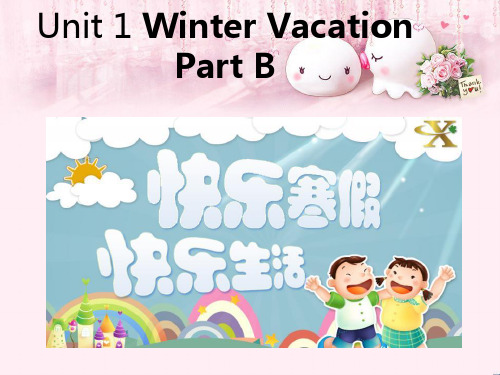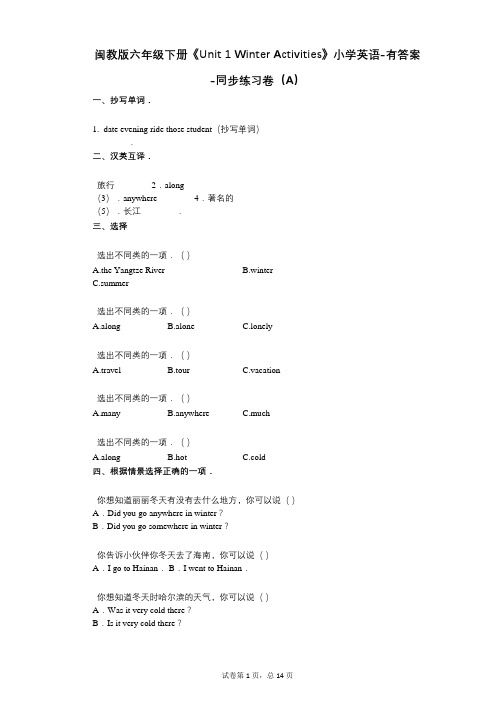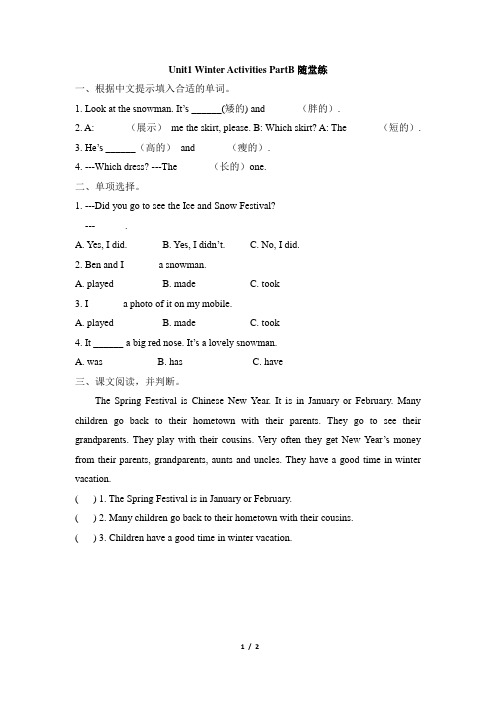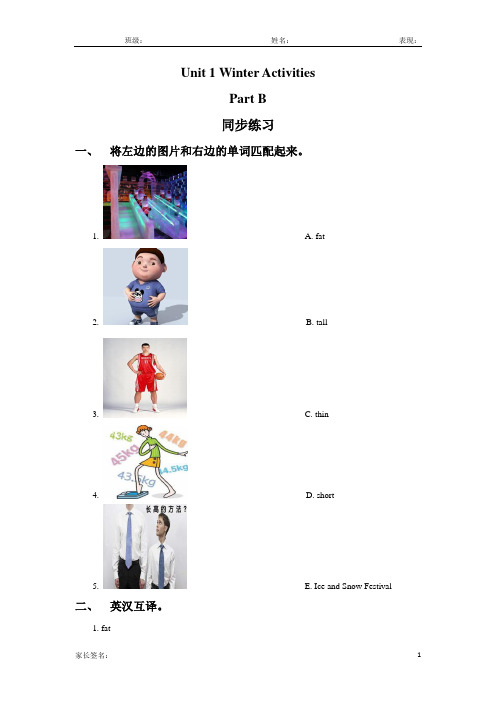六年级英语下册Unit1WinterActivities习题2(无答案)闽教版(三起)
- 格式:doc
- 大小:48.00 KB
- 文档页数:3


闽教版小学六年级下册英语unit1Winter activities单元测试一、听录音,选出你所听到的单词。
(5分)( )1. A. make B. made C. cake( )2. A. music B. students C. use( )3. A. those B. whose C. nose( )4. A. show B. snow C. slow( )5. A. lake B. make C. date二、听录音,选出与所听内容相符的图片。
(9分)Part A__________ __________ __________Part B__________ __________ __________Part C__________ __________ __________三、听录音,选出与所听句子不相符的一项。
(8 分)( )1. We went to the zoo by car.A BWe saw some fat monkeys.C( )2. It is cold in Fuzhou.A BI often ride a bike with my friends.C( )3. Mr. Liu climbed a mountain yesterday.A BThere are many tall trees there.C( )4. My grandma walks along the river everyA Bmorning. She has a healthy life.C四、听录音,选择正确的答案。
(8分)( )1. A. She stayed at home.B. She went to Beijing.( )2. A. It's rainy.B. It's sunny.( )3. A. The white shirt.B. The blue shirt.( )4. A. She's a math teacher.B. She's my sister.五、听录音,补全短文。

闽教版六年级下册《Unit 1 Winter Activities》小学英语-有答案-同步练习卷(A)一、抄写单词.1. date evening ride those student(抄写单词)________.二、汉英互译.旅行________ 2.along________(3).anywhere________ 4.著名的________(5).长江________.三、选择选出不同类的一项.()A.the Yangtze RiverB.winterC.summer选出不同类的一项.()A.alongB.aloneC.lonely选出不同类的一项.()A.travelB.tourC.vacation选出不同类的一项.()A.manyB.anywhereC.much选出不同类的一项.()A.alongB.hotC.cold四、根据情景选择正确的一项.你想知道丽丽冬天有没有去什么地方,你可以说()A.Did you go anywhere in winter?B.Did you go somewhere in winter?你告诉小伙伴你冬天去了海南,你可以说()A.I go to Hainan. B.I went to Hainan.你想知道冬天时哈尔滨的天气,你可以说()A.Was it very cold there?B.Is it very cold there?你告诉小伙伴你冬天去看爷爷奶奶了,你可以说()A.I go to see my grandpa.B.I went to see my grandpa.你想告诉小伙伴你冬天在湖上滑冰了,你可以说()A.I go skating on the lake.B.I went skating on the lake.五、填空题.Did you go anywhere________ winter?I went________ Shandong.How________ you?I went skating________ the lake.I went back________ my hometown.六、根据图片和上下文补全句子.Hi,do you go anywhere in________?Yes.I climbed a famous________.How________ you?(用am,is,are 填空)I traveled along the________.It's a very________ river.七、判断题.(T or F)Do you go anywhere in winter?________.I went to Jinan.________.I climbed a lake.________.It's a very long river.________.I took many photo.________.八、句型转换.It was very cold there.(转换成疑问句)________ very cold there?I went to ________.(对划线部分提问)________ go________ in winter?Is it a very long river?(作肯定回答)________,it is.I went to ________.(对划线部分提问)________ you________?Was it hot?(转换成陈述句)It________.九、写句子.(以过去式)你冬天有去什么地方吗,山姆?________.我去了哈尔滨.________.我拍了很多照片.________.那里冷吗?________.是的,冷而且刮风.________.参考答案与试题解析闽教版六年级下册《Unit 1 Winter Activities》小学英语-有答案-同步练习卷(A)一、抄写单词.1.【答案】date evening ride those student【考点】单词、词组Things we do: Activities【解析】date日期,evening 晚上, ride骑, those那些, student学生.【解答】考查抄写单词.根据四线三格要求,字母"a,e,v,n,r,o,s,u"在四线三格里占中格;字母"d,t,i,h"在四线三格占中上格,结合给出的单词拼写要求,完成题目.故填:.二、汉英互译.【答案】traval,沿着,任何地方,famous,the Yangtze River【考点】单词、词组Things we do: Activities【解析】(1)旅行,(2)沿着,(3)任何地方,(4)著名的,(5)长江.【解答】答案:(1)travel,(2)沿着,(3)任何地方,(4)famous,(5)the Yangtze River.考查单词翻译,(1)"旅行"对应单词"traval" ,(2)"沿着"对应单词"along",(3)"任何地方"对应单词"anywhere",(4)"著名的"对应的单词"famous",(5)"长江"对应的单词"the Yangtze River".三、选择【答案】A【考点】类别分类Things we do: Activities【解析】the Yangtze River长江,winter冬天,summer夏天.【解答】答案:A.该题考查类别分类.A是长江,专有名词;B是冬天,季节;C是夏天,季节.B和C 是季节类名词,A是专有名词,故答案是A.【答案】A【考点】词性分类Things we do: Activities【解析】along沿着,alone独自的,lonely孤独的.【解答】答案:A.该题考查词性分类.A是沿着,介词;B是独自的,形容词;C是孤独的,形容词.B 和C是形容词,A是介词,故答案是A.【答案】C【考点】词性分类Things we do: Activities【解析】travel旅行,tour旅行,vacation假期.【解答】答案:C.该题考查词性分类.A是旅行,动词;B是旅行,动词;C是假期,名词.A和B是动词,C是名词,故答案是C.【答案】B【考点】词性分类Things we do: Activities【解析】many很多;anywhere任何地方;much许多.【解答】答案:B.该题考查词性分类.A.many很多;B.anywhere任何地方;C.much许多.A和C 是形容词,B是副词,故选B.【答案】B【考点】词性分类Things we do: Activities【解析】along沿着,hot热的,cold冷的.【解答】答案:B.该题考查词性分类.A是沿着,介词;B是热的,形容词;C是冷的,形容词.B和C 是形容词,A是介词,故答案是A.四、根据情景选择正确的一项.【答案】答案:A.本题考查交际用语.A.Did you go anywhere in winter冬天你去过什么地方;B.Did you go somewhere in winter你冬天去了什么地方.注意区分"anywhere(任何地方)"和"somewhere(某些地方)".故选A.【考点】季节与天气Things we do: Activities【解析】你想知道丽丽冬天有没有去什么地方,你可以说:Did you go anywhere in winter(冬天你去过什么地方)?【解答】答案:A.本题考查交际用语.A.Did you go anywhere in winter冬天你去过什么地方;B.Did you go somewhere in winter你冬天去了什么地方.注意区分"anywhere(任何地方)"和"somewhere(某些地方)".故选A.【答案】答案:B.本题考查情景交际.I go to Hainan我去海南,用的是一般现在时;I went to Hainan.我去了海南,用的是一般过去时.你告诉小伙伴你冬天去了海南,这里应该用一般过去时.故选B.【考点】情景交际Things we do: Activities【解析】I went to Hainan.我去了海南.【解答】答案:B.本题考查情景交际.I go to Hainan我去海南,用的是一般现在时;I went to Hainan.我去了海南,用的是一般过去时.你告诉小伙伴你冬天去了海南,这里应该用一般过去时.故选B.【答案】答案:A.该题考查季节与天气的内容.根据句意"知道冬天时哈尔滨的天气"可知,该句用一般过去时态表达;Was it very cold there?那儿非常冷了吗?指过去的某一时间. Is it very cold there?那儿非常冷吗?指现在.结合题意可知A符合题意.故选A.【考点】季节与天气Things we do: Activities【解析】Was it very cold there?那儿非常冷了吗?【解答】答案:A.该题考查季节与天气的内容.根据句意"知道冬天时哈尔滨的天气"可知,该句用一般过去时态表达;Was it very cold there?那儿非常冷了吗?指过去的某一时间. Is it very cold there?那儿非常冷吗?指现在.结合题意可知A符合题意.故选A.【答案】答案:B.本题考查情景交际.I go to see my grandpa 我去看望我爷爷,用的是一般现在时;I went to see my grandpa 我去看望了我的爷爷,用的是一般过去时,表示过去的某一时间里去看了爷爷.故选B.【考点】一般过去时,动词过去式情景交际Things we do: Activities【解析】I went to see my grandpa 我去看望了我的爷爷.【解答】答案:B.本题考查情景交际.I go to see my grandpa 我去看望我爷爷,用的是一般现在时;I went to see my grandpa 我去看望了我的爷爷,用的是一般过去时,表示过去的某一时间里去看了爷爷.故选B.【答案】答案:B.本题考查文体活动.I go skating on the lake我在湖上滑冰,这里用的是一般现在时;I went skating on the lake我在湖上滑冰,这里用的是一般过去时表示过去发生的一个动作,故选B.【考点】文体活动Things we do: Activities【解析】I went skating on the lake我在湖上滑冰.【解答】答案:B.本题考查文体活动.I go skating on the lake我在湖上滑冰,这里用的是一般现在时;I went skating on the lake我在湖上滑冰,这里用的是一般过去时表示过去发生的一个动作,故选B.五、填空题.【答案】in【考点】完成句子Things we do: Activities【解析】冬天你去了什么地方吗?【解答】答案:in.该题考查完成句子.季节的前面用介词in,in winter在冬天,故填:in.【答案】to【考点】完成句子Things we do: Activities【解析】我去山东了.【解答】答案:to.该题考查完成句子.是不及物动词,后面跟名词则要加to,go to Shandong.去山东.故填:to.【答案】about【考点】完成句子Things we do: Activities【解析】你呢?【解答】答案:about.考查完成句子.How about you?意思是"你呢,你怎么样?".所以填about.【答案】on【考点】完成句子Things we do: Activities【解析】我在湖上滑冰了.【解答】答案:on.该题考查完成句子.on the lake在湖面上,根据"skating"推测后面用介词on,故填:on.【答案】to【考点】完成句子Things we do: Activities【解析】我回到我的家乡.【解答】答案:to.该题考查完成句子.go back to追溯到回到;返回到,根据句意可知,该空应填介词to,故填:to.六、根据图片和上下文补全句子.【答案】winter【考点】看图完成句子Things we do: Activities【解析】嗨,冬天你去什么地方?【解答】答案:winter.该题考查看图完成句子.图示我冬天的情景,"冬天"译为winter,在冬天in winter.故填:winter.【答案】mountain【考点】看图完成句子Things we do: Activities【解析】是的.我爬上了一个著名的山.【解答】答案:mountain.该题考查看图完成句子.图示为山,"山"译为mountain,爬山climb mountain.a是不定冠词,表示一个,mountain要用单数形式.故填:mountain.【答案】are【考点】系动词Things we do: Activities【解析】你好吗?【解答】答案:are.该题考查系动词.am的主语是"I",is的主语是"第三人称单数",are的主语是"第二人称或复数",由原文的"you",你,你们可知是第二人称,所以用are.【答案】Yangtze River【考点】看图完成句子Things we do: Activities【解析】我沿扬子江旅行.【解答】答案:Yangtze River.该题考查看图完成句子.图示为扬子江,"扬子江"译为the Yangtze River,横线前有定冠词the,故填:Yangtze River.【答案】long【考点】完成句子Things we do: Activities【解析】它是一条非常长的河.【解答】答案:long.该题考查完成句子.根据题干信息"river"推知该空应填long译为:长的,故填:long.七、判断题.(T or F)【答案】Do﹣﹣﹣Did【考点】句子改错Things we do: Activities【解析】冬天你去过一些地方吗?【解答】答案:Do﹣﹣﹣Did.该题考查句子改错.题干的句意为"冬天你去过一些地方吗",动作发生在过去,时态是一般过去时,故一般疑问句的助动词Do应该用"Did".【答案】T【考点】句子改错Things we do: Activities【解析】我去了济南.该题考查句子改错.went是一般过去时;观察主语、谓语以及宾语的形式可知该句子正确.【答案】lake改为tree.【考点】句子改错Things we do: Activities【解析】我爬上了一个湖.【解答】答案:lake改为tree.本题考查句子改错.题干句意是"我爬上了一个湖",由此可知不符合实际,可以是"爬树(climb a tree)".故将lake改为tree.【答案】T【考点】句子改错Things we do: Activities【解析】它是一条很长的河流.【解答】答案:T.该题考查句子改错.根据给出的句子,观察可知没有错误.【答案】F【考点】句子改错Things we do: Activities【解析】我照了很多照片.【解答】答案:F.该题考查句子改错.根据给出的句子,观察可知many,很多,后面加复数名词;photo的复数是"photos",八、句型转换.【答案】Was it【考点】一般疑问句Things we do: Activities【解析】【解答】答案:Was it.本题考查肯定句变成一般疑问句,句子含有be动词was,疑问句要把was提到句子开头,并大写首字母,句末用问号.故答案是:Was it.【答案】Shanghai,Didyou,anywhere【考点】就划线部分提问Things we do: Activities【解析】我去了上海.冬天你去了什么地方?【解答】答案:Did you;anywhere.本题考查划线部分提问.划线部分是Shanghai,是地点.结合给出的疑问句"﹣﹣﹣go ﹣﹣﹣in winter"可推测句意为"冬天你去了什么地方".第一人称I要变成第二人称you.一般疑问句部分用Did来引导.什么地方anywhere.故答案为Did you;anywhere.【答案】Yes【考点】一般疑问句Things we do: Activities【解析】Is it a very long river?它是一条很长的河流吗?Yes,it is.是的,它是.【解答】答案:Yes.该题考查一般疑问句.根据给出的句子可知是以"Is it"开头的一般疑问句.其回答是:Yes ,it is或No,it isn't.根据题目要求和"it is"提示可知答案是:Yes.【答案】Harbin,Wheredid,go【考点】就划线部分提问Things we do: Activities【解析】我去了哈尔滨.你去了哪里?【解答】答案:Where did;go.本题考查特殊疑问句.划线部分是Harbin,是地点,询问去什么地方,用Where提问.第一人称I要变成第二人称you.谓语动词went是动词过去式,一般疑问句部分用did来引导,谓语动词恢复原形.故答案为Where did;go?【答案】was hot【考点】改写句子Things we do: Activities【解析】天热吗?【解答】答案:was hot.考查改写句子."was"系动词过去式,放在句首,引导一般疑问句,主语"it".陈述句结构:主谓宾顺序,把"was"放在主语"it"后面;大写首字母,标点符号改成句号,故填:was hot.九、写句子.(以过去式)【答案】Didyougoanywhereinwinter,Sam【考点】汉译英Things we do: Activities【解析】Did you go anywhere in winter,Sam?【解答】答案:Did you go anywhere in winter,Sam?本题考查汉译英.根据所给汉语,可以判断这是一个一般疑问句,时态应该是一般过去时,去什么地方用 go anywhere 表示,在冬天用in winter表示,这里go是一个实意动词,一般疑问句需要加助动词did.故答案为:Did you go anywhere in winter,Sam?【答案】I went to Harbin【考点】汉译英Things we do: Activities【解析】I went to Harbin.【解答】答案:I went to Harbin.该题考查汉译英.根据句意,本句是一个陈述句,时态应该用一般过去时,主语是I,去某地用go to表示,这里go的过去式是went,哈尔滨用Harbin表示,.故答案为:I went to Harbin.【答案】I took many photos【考点】汉译英Things we do: Activities【解析】我拍了很多照片.I took many photos.【解答】答案:I took many photos.本题考查汉译英.根据所给汉语句子,可以判断句子是一个陈述句,时态应该是一般过去时,主语是I,拍照用take photo表示,take的过去式是took,很多用many表示.故答案为:I took many photos.【答案】Was it cold?【考点】汉译英Things we do: Activities【解析】Was it cold?【解答】答案:Was it cold?本题考查汉译英.根据所给句子,可以判断句子时态应该用一般过去时,句子是was引导的一般疑问句,冷的用cold表示,一般和be连用.故答案为:Was it cold?【答案】Yes,it's cold and windy【考点】汉译英Things we do: Activities【解析】是的,冷而且刮风.Yes,it's cold and windy.【解答】答案:Yes,it's cold and windy.本题考查汉译英.根据所给汉语,可以判断这是一个陈述句,时态应该是一般现在时,是的用yes表示,冷的用cold表示,有风的用windy表示.故答案为:Yes,it's cold and windy.。


Unit1 Winter Activities PartB随堂练一、根据中文提示填入合适的单词。
1. Look at the snowman. It’s ______(矮的) and ______(胖的).2. A: ______(展示)me the skirt, please. B: Which skirt? A: The ______(短的).3. He’s ______(高的)and ______(瘦的).4. ---Which dress? ---The ______(长的)one.二、单项选择。
1. ---Did you go to see the Ice and Snow Festival?---______.A. Yes, I did.B. Yes, I didn’t.C. No, I did.2. Ben and I ______ a snowman.A. playedB. madeC. took3. I ______ a photo of it on my mobile.A. playedB. madeC. took4. It ______ a big red nose. It’s a lovely snowman.A. wasB. hasC. have三、课文阅读,并判断。
The Spring Festival is Chinese New Year. It is in January or February. Many children go back to their hometown with their parents. They go to see their grandparents. They play with their cousins. Very often they get New Year’s money from their parents, grandparents, aunts and uncles. They have a good time in winter vacation.( ) 1. The Spring Festival is in January or February.( ) 2. Many children go back to their hometown with their cousins.( ) 3. Children have a good time in winter vacation.1 / 2参考答案:一、1. short; fat2. Show; short3. tall; thin4. long二、1-4 ABCB三、1-3 √×√2 / 2。

Unit 1 Winter ActivitiesPart B同步练习一、将左边的图片和右边的单词匹配起来。
1. A. fat2. B. tall3. C. thin4. D. short5. E. Ice and Snow Festival二、英汉互译。
1. fat _____________2. short ____________3. 给…看____________4. 瘦的____________5. Ice and Snow Festival________三、根据情景选择正确的一项。
1.你想知道丽丽有没有去看冰雪节,你可以说:A. Did you go to see the Ice and Snow Festival?B. Did you went to see the Ice and Snow Festival?2.你告诉小伙伴你去的时候人很多,你可以说:A. There are many people.B. There were many people.3.你想知道小伙伴玩的开不开心,你可以说:A. Did you have fun?B. Did you had fun?4.你想看小伙伴拍的照片,你可以说:A. Show me the photo, please.B. Give me the photo.5.你想夸赞小伙伴堆的雪人,你可以说:A. It‘s a good snowman.B. It’s a lovely snowman.四、填空题。
1. Did you go ____ see the mountain?2. Did you have fun _____ the snow?3. I took a photo _______ it.4. Look ______ the snowman.5. It is ______ January.五、默写句子。
1.春节是中国的新年。
2.许多孩子和他们的父母回到家乡。
Unit 1 Winter Activities班级姓名分数一、按字母表顺序写出所缺的相邻字母。
(10分)D f N R g二、正确抄写下列句子,并在括号里写出中文意思。
(注意大、小写和标点符号)(10分)Cold and windy ( ) have fun ( ) go back ( )They have a good time in winter vacation. Did you go to see the ice and snow festival?( ) ( )三、写出下列动词的过去式。
(10分)make→go→am→take→climb→四、选择适当的动词填空,并在括号里写出中文意思。
(12分)1. a flower show( )2. some books( )3. snowmen( )4. New Year money ( )5. a mountain( )6. at home( )五、根椐句意完成句子。
(8分)1.We together.2. I went to Shangdong. I .3.I of it on my mobile .4. Yesterday was Sunday. I the Yangtze River.六、椐据句意完成句子。
(20分)1. It’s _____(矮的) and (胖的)2. He is (高的)and ( 瘦的).3.___ (给…..看) me the dress. 4. I climbed a (著名的) mountain .5. Did you go (任何地方) in winter. 6They play with their (堂兄弟姐妹)。
7.There____(be) a big ice city. 8. There____(be) many people七、选词填空, 将答案写在横线上。
(10分)1. I often to school at seven o’clock.(go goes went )2. I many photos last week. (take , takes , took ).3. Sometimes Lily ____ up at six. ( get , gets , got ).4.I usually _____rice and fish for lunch. ( have, had , has )5.He always ___ TV on Sundays. ( watched, watches.)七、阅读短文,判断句子正(T)、误(F)。
Unit 1 Winter ActivitiesPart A同步练习一、默写单词。
1.任何地方________________2.著名的__________________3.旅行___________________4.沿着___________________5.长江___________________二、根据图片补充单词。
1. m _ _ _ t _ _ _2.w _ _ t _ _3.the Y _ _ _ t _ e R _ v _ _4. t _ a _ _ _5.w _ _ d _三、判断题。
(T or F)1. Do you go anywhere in winter? ( )2. I went to Jinan. ( )3. I climbed a lake. ( )4. It’s a very long river. ( )5. I took many photo. ( )四、句型转换。
1. It was very cold there. (转换成疑问句)______ ______ very cold there?2. I went to Shanghai. (对划线部分提问)_____ _____ go ________ in winter?3. Is it a very long river? (作肯定回答)_______, it is.4. I went to Harbin. (对划线部分提问)_____ _____ you _____?5. Was it hot? (转换成陈述句)It ______ _______.五、翻译句子。
(以过去式)1.你好,茱莉亚。
你冬天有去什么地方吗?2.我爬了一座著名的山。
3.我沿着长江旅游了。
4.它是一条很长的河。
5.我去了山东。
参考答案:一、1. anywhere 2.famous 3.travel 4.along 5.the Yangtze River二、1. mountain 2.winter 3.the Yangtze River 4.travel 5.windy三、1-5 FTFTF四、1. Was it2. Did you; anywhere3. Yes4. Where; did; go5. was hot五、1. Hi, Julia. Did you go anywhere in winter?2. I climbed a famous mountain.3. I traveled along the Yangtze River.4. It’s a long river.5. I went to Shandong.。
Unit 1 Winter Activities
班级姓名分数
一、按字母表顺序写出所缺的相邻字母。
(10分)
D f N R g
二、正确抄写下列句子,并在括号里写出中文意思。
(注意大、小写和标点符号)(10分)
Cold and windy ( ) have fun ( ) go back ( )
They have a good time in winter vacation. Did you go to see the ice and snow festival?
( ) ( )
三、写出下列动词的过去式。
(10分)
make→go→am→take→climb→
四、选择适当的动词填空,并在括号里写出中文意思。
(12分)
1. a flower show( )
2. some books( )
3. snowmen( )
4. New Year money ( )
5. a mountain( )
6. at home( )
五、根椐句意完成句子。
(8分)
1.We together.
2. I went to Shangdong. I .
3.I of it on my mobile .
4. Yesterday was Sunday. I the Yangtze River.
六、椐据句意完成句子。
(20分)
1. It’s _____(矮的) and (胖的)
2. He is (高的)and ( 瘦的).
3.___ (给…..看) me the dress. 4. I climbed a (著名的) mountain .
5. Did you go (任何地方) in winter. 6They play with their (堂兄弟姐妹)。
7.There____(be) a big ice city. 8. There____(be) many people
七、选词填空, 将答案写在横线上。
(10分)
1. I often to school at seven o’clock.(go goes went )
2. I many photos last week. (take , takes , took ).
3. Sometimes Lily ____ up at six. ( get , gets , got ).
4.I usually _____rice and fish for lunch. ( have, had , has )
5.He always ___ TV on Sundays. ( watched, watches.)
七、阅读短文,判断句子正(T)、误(F)。
(10分)
Tom is a little boy. He is five. Today his father takes him to see his grandparents. His home is far away from his grandparents. So they are going there by bus. There are only nine people on it. They all have seats Tom is very happy. He is running about on the bus. His father says, “don’t run! Sit down, please. ” “I miss my grandfather and grandmot her very much. I want this bus to go faster.”Tom says.
( )1. Tom goes to see his grandparents with his mother.
( )2. Tom goes to see his grandparents’ home by bus.
( )3. Tom and his father are running on the bus.
( )4. Tom’s home is far away from his grandparents’.
( )5. The driver tells Tom to sit down.
八.阅读短文,选择正确答案,将其序号填入题前括号内。
10
The Spring Festival(春节)is our Chinese people’s festival. There are different names for each year. We all call it the year of monkey, the year of dog… and this year is the year of Chicken.
Before the day of the festival, people are busy shopping and cleaning. On the Eve(除夕), there is a big family dinner. After dinner, all the family stay up late(守夜) to welcome the new year. In the middle of the night, we have some dumplings(饺子) and watch TV. On the first day of the New Year, people wear new clothes to visit their relatives and say “Happy New Year” to each other.
( )1. There are different names for Chinese years.
A. 10
B. 11
C. 12
( )2. When is the Eve in Chinese year?
A. The evening of the Spring Festival.
B. The evening before the Spring Festival.
C. The evening after the Spring Festival.
( )3. People before the Spring Festival.
A.sing and dance
B.go shopping and clean the house
C.play games
( )4. are the favorite food for Chinese people on the Eve.
A. Cakes
B. Dumplings
C. Noodles
( )5. On the festival people usually .
A. wear new clothes
B. go to visit their relatives
C. A and B。